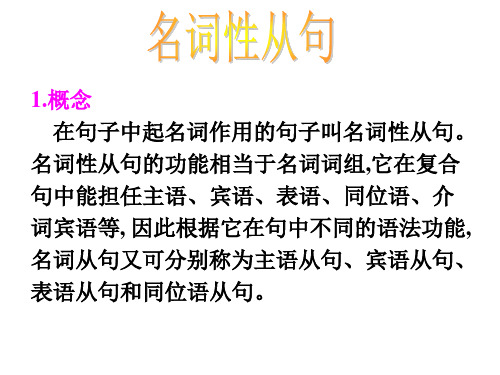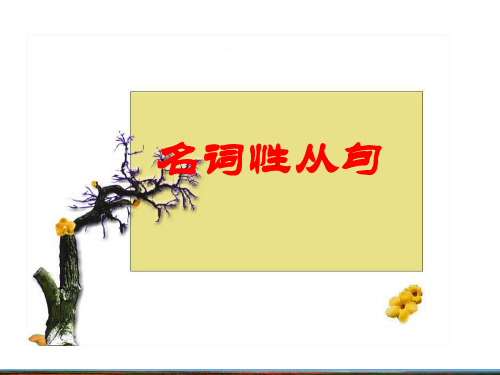名词性从句(精讲课件)
合集下载
名词性从句PPT课件

1.概念 在句子中起名词作用的句子叫名词性从句。
名词性从句的功能相当于名词词组,它在复合 句中能担任主语、宾语、表语、同位语、介 词宾语等, 因此根据它在句中不同的语法功能, 名词从句又可分别称为主语从句、宾语从句、 表语从句和同位语从句。
Who will win the match is still unknown.
whichever (book) you like.
whose
• Whose表示“谁的”。 • 在句子中充当定语的成分,其后一定会加
when, where, how, why, however… when, where, how, why, however…
that的用法
• 在从句中不充当任何成分,也没有任何具体意思。 • 引导的句子相当于一个陈述句。 • 只起到连接的作用。
主语 做及物动词宾语
宾语 做介词宾语
表语 同位语
一般不省略 可以省略 不可以省略 一般不省略 一般不省略
(3) It + 不及物动词+从句 It seems that… 似乎… It happened that… 碰巧… It appears that… 似乎…
(4) It is + 过去分词+从句 It is reported that… 据报道… It has been proved that… 已证实… It is said that… 据说…
He doesn’t know whether to stay or not. E) 后面紧接or not 时。如:
We didn’t know whether or not she was ready.
② 关联词只能用 whether或if, 不能用 that的情况如下:
名词性从句的功能相当于名词词组,它在复合 句中能担任主语、宾语、表语、同位语、介 词宾语等, 因此根据它在句中不同的语法功能, 名词从句又可分别称为主语从句、宾语从句、 表语从句和同位语从句。
Who will win the match is still unknown.
whichever (book) you like.
whose
• Whose表示“谁的”。 • 在句子中充当定语的成分,其后一定会加
when, where, how, why, however… when, where, how, why, however…
that的用法
• 在从句中不充当任何成分,也没有任何具体意思。 • 引导的句子相当于一个陈述句。 • 只起到连接的作用。
主语 做及物动词宾语
宾语 做介词宾语
表语 同位语
一般不省略 可以省略 不可以省略 一般不省略 一般不省略
(3) It + 不及物动词+从句 It seems that… 似乎… It happened that… 碰巧… It appears that… 似乎…
(4) It is + 过去分词+从句 It is reported that… 据报道… It has been proved that… 已证实… It is said that… 据说…
He doesn’t know whether to stay or not. E) 后面紧接or not 时。如:
We didn’t know whether or not she was ready.
② 关联词只能用 whether或if, 不能用 that的情况如下:
高一英语名词性从句课件用ppt.ppt

2. She wondered if the buses would still be running. 宾语从句
3. The truth is that the fog is too thick for the bus to run that far. 表语从句
4. She sensed that she was being watched by a tall man in a dark coat. 宾语从句
二、时态
1. 如果主句是现在的时态 (包括一般现在时 , 现在进行时,现在完成时),从句的时态可根 据实际情况而定,(包括一般现在时,一般过 去时,一般将来时,现在完成时等)。
❖I know he lives here . ❖I know he lived here ten years ago . ❖I have heard that he will come tomorrow .
Practice time
if / whether
1. I asked her _i_f_/__w_h_e_t_h_e_r_ she had a bike. 2. We’re worried about __w_h_e_t_h_e_r_ he is safe. 3. I don’t know __w_h_e_t_h_e_r_ he is well or not. 4. I don’t know _w__h_e_th_e_r_ or not he is well. 5. I don’t know _w_h_e_t_h_e_r_/_if_ I should go.
❖ We don’t know _w_h_y____ they didn’t finish the job in time.
3. The truth is that the fog is too thick for the bus to run that far. 表语从句
4. She sensed that she was being watched by a tall man in a dark coat. 宾语从句
二、时态
1. 如果主句是现在的时态 (包括一般现在时 , 现在进行时,现在完成时),从句的时态可根 据实际情况而定,(包括一般现在时,一般过 去时,一般将来时,现在完成时等)。
❖I know he lives here . ❖I know he lived here ten years ago . ❖I have heard that he will come tomorrow .
Practice time
if / whether
1. I asked her _i_f_/__w_h_e_t_h_e_r_ she had a bike. 2. We’re worried about __w_h_e_t_h_e_r_ he is safe. 3. I don’t know __w_h_e_t_h_e_r_ he is well or not. 4. I don’t know _w__h_e_th_e_r_ or not he is well. 5. I don’t know _w_h_e_t_h_e_r_/_if_ I should go.
❖ We don’t know _w_h_y____ they didn’t finish the job in time.
高考英语语法完全讲解——名词性从句课件(共17张PPT)

三、what/whatever与
which/whichever的区别
what/whatever意为“什么/无论什么”,描述的事物在上下 文中没有范围;which/whichever意为“哪个/无论哪个”, 描述的事物在上下文中有范围。 To be honest, I can hardly understand what/whatever you have said. Here is the dress. This is what I have been dreaming of. Here are many beautiful dresses. You can choose whichever you like.
高考英语语法完全讲解 名词性从句
定义及分类
在句中起到名词所能充当的句子成分的从句称之 为名词性从句,名词常用来作主语、宾语、表语、 同位语,因此,对应的名词性从句可以分为四大 类:主语从句、宾语从句、表语从句、同位语从 句。
主句从句
1、作句子主语的从句叫作主语从句。 2、为避免句子头重脚轻,常用形式主语it代替主语从 句,把主语从句置于句尾。常用的句型有:It is/was+ 形容词/名词/过去分词+that从句。
表语从句
位于系动词之后作表语的从句叫表语从句。 The problem is who is to pay and when we can start.
同位语从句
同位语从句说明其前面名词的具体内容。通常由that引 导,常接同位语从句的名词有:news, conclusion, possibility, rumor, certainty, story, word, mystery, idea, doubt, hope, truth, question, belief, fact, message, evidence, information, explanation, rule, probability, question, wish, thought, statement, report, opinion, principle等。
高中英语名词性从句课件(共42张ppt)

China is no longer _w__h_a_t_ it used to be.
4. A modern city has been set up in ______ was a wasteland ten years ago. (天津) A. what B. which C. that D. where
which
作主/宾/
3. 连接副词: when、 where、why、ho表w
作状语
主语从句一般有三种结构: 1. 主语从句+谓语 That she will win the match is certain. 2.主语从句+形容词(名词词组、过去分词)+that从句
It is important that we teens should learn English. It is a good news that he will attend the meeting on behalf of our school.
1. __T_h_a__t _ he said so made us angry . _W___h_a_t_ he said at the meeting made us angry.
2. A computer can only do___w__h_a_t__ you have
instructed it to do. (全国) 3. 中国不再是过去的样子了。
It looks as if it’s going to rain.
3.the reason why … is that … 和It is because …等结构。
It was because I got up late.
同位语从句在句中作同位语,它一般要放在主 句中某些名词的后面,说明这些名词的含义。可跟 同位语从句的名词主要有: fact, news, promise, reason, idea, hope, word, belief等。 如:
4. A modern city has been set up in ______ was a wasteland ten years ago. (天津) A. what B. which C. that D. where
which
作主/宾/
3. 连接副词: when、 where、why、ho表w
作状语
主语从句一般有三种结构: 1. 主语从句+谓语 That she will win the match is certain. 2.主语从句+形容词(名词词组、过去分词)+that从句
It is important that we teens should learn English. It is a good news that he will attend the meeting on behalf of our school.
1. __T_h_a__t _ he said so made us angry . _W___h_a_t_ he said at the meeting made us angry.
2. A computer can only do___w__h_a_t__ you have
instructed it to do. (全国) 3. 中国不再是过去的样子了。
It looks as if it’s going to rain.
3.the reason why … is that … 和It is because …等结构。
It was because I got up late.
同位语从句在句中作同位语,它一般要放在主 句中某些名词的后面,说明这些名词的含义。可跟 同位语从句的名词主要有: fact, news, promise, reason, idea, hope, word, belief等。 如:
《名词性从句写作》课件

whose在从句中充当成分,如定语、主语、宾 语等
不可省略的情况:当whose引导的定语从句修 饰整个句子时,不可省略whose
03 名词性从句的时态与语态
CHAPTER
时态的用法
一般现在时
表示现在的状态、习惯或真理 。
现在进行时
表示正在进行的动作或状态。
现在完成时
表示已经完成的动作或状态, 强调对现在的影响。
谢谢
THANKS
解释名词或概念
• 总结词:名词性从句可以用来进一步解释或定义某个名词或概念。
• 详细描述:在写作中,使用名词性从句来对某个名词或概念进行解释或定义,能够使读者更加深入地理解相关内容,增 强文章的可读性和理解性。例如,“The concept of sustainability means developing in a way that meets the needs of the present without compromising the ability of future generations to meet their own needs.”(可 持续发展的概念是指在满足当代需求的同时,不损害子孙后代满足自身需求的能力的发展方式。)
表达因果关系
总结词
名词性从句可以用来表示因果关系,使逻辑更加严密。
详细描述
通过使用名词性从句来表达因果关系,可以使句子之间的逻辑更加清晰,增强文章的连贯性和说服力 。例如,“The reason why we support this policy is that it will benefit the majority of people.”(我们支持这项政策的原因是它将惠及大多数人。)
详细描述
这道练习题要求学生综合运用名词性从句进行写作,通过 实际操作掌握名词性从句的运用技巧,提高写作表达能力 。
不可省略的情况:当whose引导的定语从句修 饰整个句子时,不可省略whose
03 名词性从句的时态与语态
CHAPTER
时态的用法
一般现在时
表示现在的状态、习惯或真理 。
现在进行时
表示正在进行的动作或状态。
现在完成时
表示已经完成的动作或状态, 强调对现在的影响。
谢谢
THANKS
解释名词或概念
• 总结词:名词性从句可以用来进一步解释或定义某个名词或概念。
• 详细描述:在写作中,使用名词性从句来对某个名词或概念进行解释或定义,能够使读者更加深入地理解相关内容,增 强文章的可读性和理解性。例如,“The concept of sustainability means developing in a way that meets the needs of the present without compromising the ability of future generations to meet their own needs.”(可 持续发展的概念是指在满足当代需求的同时,不损害子孙后代满足自身需求的能力的发展方式。)
表达因果关系
总结词
名词性从句可以用来表示因果关系,使逻辑更加严密。
详细描述
通过使用名词性从句来表达因果关系,可以使句子之间的逻辑更加清晰,增强文章的连贯性和说服力 。例如,“The reason why we support this policy is that it will benefit the majority of people.”(我们支持这项政策的原因是它将惠及大多数人。)
详细描述
这道练习题要求学生综合运用名词性从句进行写作,通过 实际操作掌握名词性从句的运用技巧,提高写作表达能力 。
名词性从句-完整版PPT课件精选全文

3. 连接副词:when(=the time when什么时候,何时),where(=the place where什么地方,何地),how(=the way that/in which怎样, 以……方式,如何),why=the reason why为什么)。它们除起连 接作用,还在从句中作状语。
3) wh类连接词引导的主语从句: wh类连接词包括wh类的连接代词(who, whom,
whose, which, what, whoever, whomever, whichever, whatever等)和连接副词(when,
where, how, why, whenever, wherever, however 等)。what, when和wh-ever类的词有时可不表 疑问。wh类连接代词在句中既起连接作用, 又可充当主语、宾语、表语、定语等成分。 wh类连接副词在句中起连接作用,在从句中 可充当时间、地点、原因、方式状语。
【温馨提示】 ①whether/ if引导宾语从句表示“是否”
的意思时,一般情况下可互换。 ②if引导宾语从句时可以有否定式,而
whether从句则没有。 e.g. I don’t care if he doesn’t come.
5) 特殊疑问词引导的宾语从句: 由who, what, how, which, whose, where, why等词引导的宾语从句,可作动词、 介词及形容词的宾语。
【温馨提示】 doubt, doubtful与sure后名词性从句连接词 that, whether, if的选择。 ①当doubt, doubtful用于肯定句时,后面的名
词性从句的连接词常用whether或if;当 doubt, doubtful用于否定句或疑问句时,后 面名词性从句的连接词用that。
名词性从句公开课ppt课件

考点一 连接词 that / what 的选用
总结归纳:
that 和 what 都可引导所有的 名词性从句。但是,_w_h_a_t__除起连 接作用外,还在名词性从句中充当 成分,可作从句的_主_语__、_宾_语__、 _表___语___、或_定__语_。而_th_a_t__在名词性从 句中不充当任何成分,只起 __连__接___作用。
• 步骤二:如果从句中既不缺少主语,宾语, 表语,定语,但是缺少一定意义的状语, 则考虑用连接副词;
• 步骤三:如果既不缺少主语,宾语,表语, 定语,也不缺少状语,则考虑用从属连词。
基础回顾2
Conjunctions of Noun Clauses
从属连词
有词义, 但不做成分
that(无词义), whether, if as if/as though
考点一 连接词 that / what
Fans believe _t_h_a_t_ Jinyong's death is definitely a huge loss to the wuxia world. However, there is a saying _th__a_t _ where there are Chinese people, there are kungfu legends. _W__h_a_t we can do is to may he rest in peace and remember him forever.
宾语从句 表语从句
同位语从句
·
主语从句
• That anti-China separatists try to destroy the city is the biggest threat for HongKong.
高中英语语法-名词性从句精讲(共73张PPT)

Whoever wants the book may have it. I’ll do whatever I can to help him. Buy whichever is cheapest.
连接副词 when, where, how, why
when • When they will start is unknown yet. where • Where she has gone is a mystery. how • How this happened is not clear. why • Why he did that wasn’t quite unclear.
主语从句关联词 连词 that, whether 连接代词 what, who, whom, which 连接副词 when, where, how, why
连词 that, whether
只起连接作用 在从句中不充当任何句子成分
• That he will win is certain.
• It has been reported that sales of beef in China will increase.
宾语从句关联词 连词 that, whether; if 连接代词 what, who, whom, whose, which 连接副词 when, where, how, why
• I doubt _______ he will come soon. • I do not doubt _____ he will come soon. • Do you doubt _____ he will come soon?
• what surprised me was what he said.
- 1、下载文档前请自行甄别文档内容的完整性,平台不提供额外的编辑、内容补充、找答案等附加服务。
- 2、"仅部分预览"的文档,不可在线预览部分如存在完整性等问题,可反馈申请退款(可完整预览的文档不适用该条件!)。
- 3、如文档侵犯您的权益,请联系客服反馈,我们会尽快为您处理(人工客服工作时间:9:00-18:30)。
The problem is … The problem is how we should use modern technology.
When will man be able to live on Mars?
….is unknown to us all.
When man will be able to live on Mars is unknown to us all.
2. The news that they won the game spread the
whole school. 同位语从句 3. I don’t think that he is an honest boy宾. 从
4. Do you know the man who is standing over
连 接
连接代词:who, whom, whoever, whose, what, whatever, which, whichever
词
从句中缺少主、宾、表
连接副词:when, where, why, how, whenever 在从句中做状语 wherever
3.名词性从句注意事项:
1)名词性从句必须用陈述语序; How should we use modern technology?
2)whether与if 的区别:
引导名词性从句表“是否”时,常用 whether,例如:引导主语从句位于句首时用 whether不用if;表语从句和同位语从句,用 whether不用if;位于介词后的宾语从句只用 whether不用if.
Whether it is true remains a question.
4. It + be + n. + that从句
a pity, a shame, an honor, no wonder…
5.固定表达: It occurs to sb. that… 某人突然想起… It’s up to sb. that… …取决于某人
Attention
1.That引导主语从句时,虽不 充当成分也不表示意义,但不
1.位于系动词后面的句子称为表语从句,常 见的系动词有:be, seem, look like, sound, look, feel,
smell… It sounds that his words is reasonable.
1.根据名词在句中所作成分,可将名 词性从句分为:
主语从句 Subject Clause
名 词 表语从句 Predicative Clause
性 从
宾语从句 Object Clause
句
同位语从句 Appositive Clause
Find and guess
1. What I want to do is taking a bath. 主从
1. It + be +adj. + that 从句
necessary, important, obvious, clear, possible…
2. It + be + Vpp. + that 从句
said, reported, believed, expected, thought…
3. It + Vt. + 宾 + that从句 surprise, amaze, worry, concern, please
there. 5. It is
定语从句
said that he won
the
game.
主语从句
6. The fact is that he stole the car. 表语从句
2.名词性从句的引导词,即连接词: that 无意义,不充当成分,用于连接
主从句
连词 Whether/if “是否”,不充当成分
a.Which; belong to
b. As, belonged to
b.c. What; belonging to d. It; belonging to
4. It’s known to us all ___ a form of energy .
A. water is C. is water
B. that water is D. that water to
Hale Waihona Puke 能省略;2. 一个主语从句做主语时,视为单数, 谓语动词用相应的单数形式;
多个主语从句做主语时,视为复数,谓语 动词用相应的复数形式;
一个引导词引导多个主语从句做主语时视 为单数,谓语动词用相应的单数形式。
1. ___ he made an important speech at the meeting was true.
It depends on whether I have enough time.
There is some doubt whether he will go or stay.
当句子位于主语位置时,称为主语从句; 但有时句子过长,而其它成分较短时,常用 it充当形式主语,而将主语从句位于句末。 常见句型如下:
A. That B. Why C. What D. How
2. ___we’ll go camping tomorrow depends on the weather .
A If B Whether C That D Where
3.___ is known to us all is that America is a developed country____the First World.
5. It worried her a bit ___ her hair was turning gray.
A. whether B. That C. what D. when
6.What I say and think ___ none of your business.
A. is B. are C. has D have
1. We like E﹏ngl﹏ish c﹏lass.
主+谓+宾
名词可在句中充 当主语、表语、
﹏﹏ 2. The book is interesting.同位语、宾语
主+系+表
﹏﹏﹏﹏ 3. The lady, Miss Zhang, is our English teacher.
同位语
主+系+表
When will man be able to live on Mars?
….is unknown to us all.
When man will be able to live on Mars is unknown to us all.
2. The news that they won the game spread the
whole school. 同位语从句 3. I don’t think that he is an honest boy宾. 从
4. Do you know the man who is standing over
连 接
连接代词:who, whom, whoever, whose, what, whatever, which, whichever
词
从句中缺少主、宾、表
连接副词:when, where, why, how, whenever 在从句中做状语 wherever
3.名词性从句注意事项:
1)名词性从句必须用陈述语序; How should we use modern technology?
2)whether与if 的区别:
引导名词性从句表“是否”时,常用 whether,例如:引导主语从句位于句首时用 whether不用if;表语从句和同位语从句,用 whether不用if;位于介词后的宾语从句只用 whether不用if.
Whether it is true remains a question.
4. It + be + n. + that从句
a pity, a shame, an honor, no wonder…
5.固定表达: It occurs to sb. that… 某人突然想起… It’s up to sb. that… …取决于某人
Attention
1.That引导主语从句时,虽不 充当成分也不表示意义,但不
1.位于系动词后面的句子称为表语从句,常 见的系动词有:be, seem, look like, sound, look, feel,
smell… It sounds that his words is reasonable.
1.根据名词在句中所作成分,可将名 词性从句分为:
主语从句 Subject Clause
名 词 表语从句 Predicative Clause
性 从
宾语从句 Object Clause
句
同位语从句 Appositive Clause
Find and guess
1. What I want to do is taking a bath. 主从
1. It + be +adj. + that 从句
necessary, important, obvious, clear, possible…
2. It + be + Vpp. + that 从句
said, reported, believed, expected, thought…
3. It + Vt. + 宾 + that从句 surprise, amaze, worry, concern, please
there. 5. It is
定语从句
said that he won
the
game.
主语从句
6. The fact is that he stole the car. 表语从句
2.名词性从句的引导词,即连接词: that 无意义,不充当成分,用于连接
主从句
连词 Whether/if “是否”,不充当成分
a.Which; belong to
b. As, belonged to
b.c. What; belonging to d. It; belonging to
4. It’s known to us all ___ a form of energy .
A. water is C. is water
B. that water is D. that water to
Hale Waihona Puke 能省略;2. 一个主语从句做主语时,视为单数, 谓语动词用相应的单数形式;
多个主语从句做主语时,视为复数,谓语 动词用相应的复数形式;
一个引导词引导多个主语从句做主语时视 为单数,谓语动词用相应的单数形式。
1. ___ he made an important speech at the meeting was true.
It depends on whether I have enough time.
There is some doubt whether he will go or stay.
当句子位于主语位置时,称为主语从句; 但有时句子过长,而其它成分较短时,常用 it充当形式主语,而将主语从句位于句末。 常见句型如下:
A. That B. Why C. What D. How
2. ___we’ll go camping tomorrow depends on the weather .
A If B Whether C That D Where
3.___ is known to us all is that America is a developed country____the First World.
5. It worried her a bit ___ her hair was turning gray.
A. whether B. That C. what D. when
6.What I say and think ___ none of your business.
A. is B. are C. has D have
1. We like E﹏ngl﹏ish c﹏lass.
主+谓+宾
名词可在句中充 当主语、表语、
﹏﹏ 2. The book is interesting.同位语、宾语
主+系+表
﹏﹏﹏﹏ 3. The lady, Miss Zhang, is our English teacher.
同位语
主+系+表
